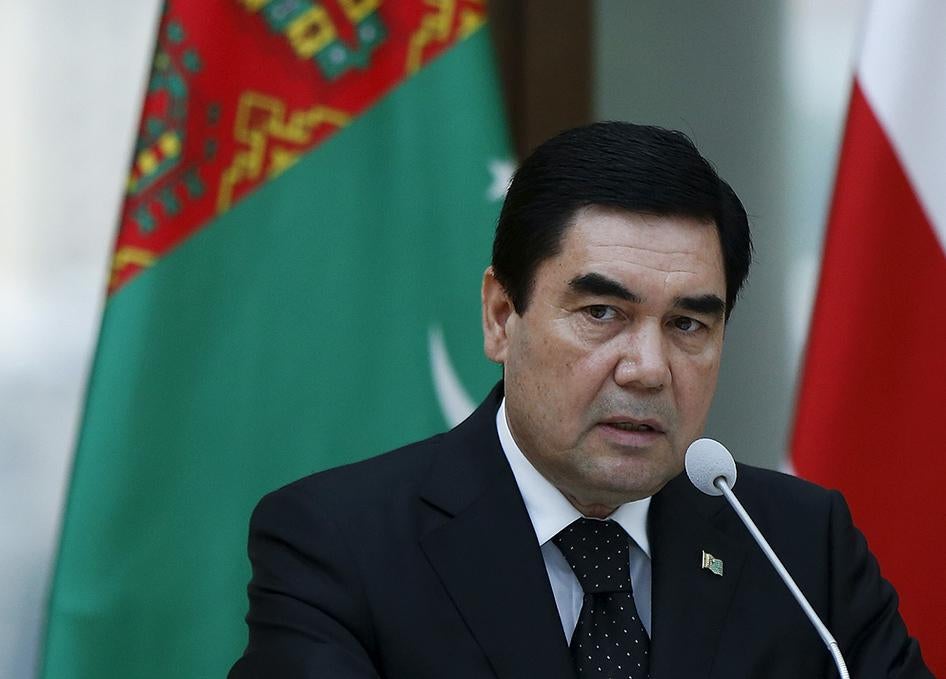(Berlin) – German Chancellor Angela Merkel should press President Gurbanguly Berdymukhamedov of Turkmenistan to end enforced disappearances and address other serious human rights problems in the country. President Berdymukhamedov is scheduled to meet Chancellor Merkel and other leading officials in Berlin on August 29, 2016, to discuss economic ties and other issues.
Turkmenistan is one of the world’s most closed and repressive countries. The government tolerates no dissent, tightly controls all media, and arbitrarily bans people from leaving the country. It also refuses to reveal to family and loved ones the fate and whereabouts of dozens of people who were tried and imprisoned in the early 2000s.
“This is one of those rare opportunities for a world leader to stand up for those in Turkmenistan who cannot engage their own government,” said Hugh Williamson, Europe and Central Asia director at Human Rights Watch. “Chancellor Merkel should not miss this opportunity to speak directly and forcefully about the need to end repression in Turkmenistan.”
Dozens of people, most of whom were arrested in the late 1990s and early 2000s, have simply
disappeared into the Turkmen prison system. Families of the disappeared have had no official information about the fate, whereabouts, or health of their loved ones since their arrest and trial. These include former Foreign Minister Boris Shikhmuradov, his brother Konstantin, and a former Organization for Security and Co-operation in Europe ambassador, Batyr Berdiev. In 2014, the United Nations Human Rights Committee recognized Shikhmuradov as a victim of an enforced disappearance and stated that the Turkmen government must release him.
The international
Prove They Are Alive! campaign, initiated by human rights groups including Human Rights Watch, has documented how, in a form of collective punishment, the authorities have arrested the relatives of several of the disappeared prisoners, had them fired from jobs, confiscated their property, or denied them permission to travel abroad.
Enforced disappearances constitute one of the gravest human rights violations, and are strictly prohibited in all circumstances. The victims include not only those forcibly disappeared, but also their families and loved ones, who are subjected to anguish not knowing the fate of the disappeared. In certain contexts, enforced disappearances can also amount to war crimes or crimes against humanity. The fate of those forcibly disappeared in detention should be immediately clarified, and they should be released.
In addition to those forcibly disappeared, in 2015,
Saparmamed Nepeskuliev, a freelance correspondent for the Turkmen language service of Radio Free Europe/Radio Liberty, was tried and imprisoned on bogus drug charges, and the government forced three other Radio Liberty correspondents to cease working for the service. In December, the UN Working Group on Arbitrary Detentions recognized Nepeskuliev as a victim of arbitrary detention, punished for having peacefully exercised his right to freedom of expression.
“Chancellor Merkel should urge Berdymukhamedov to free Nepeskuliev,” Williamson said. “He’s in jail merely for doing what correspondents everywhere do – trying to share information about what’s happening in his country.”
A new draft constitution under consideration in Turkmenistan does not limit the number of presidential terms in office and lifts presidential age limits, thus allowing President Berdymukhamedov to remain in power for life. The draft fails to ban censorship and uphold the right to distribute information, and contains no guarantee of freedom of movement to travel abroad. The German government should urge the Turkmen leadership not to adopt the constitution until it has been reviewed by an international expert body such as the Council of Europe’s Venice Commission or Office for Democratic Institutions and Human Rights of the Organization for Security and Cooperation in Europe (OSCE).
The Turkmen government
blacklists from foreign travel various groups of people, including students leaving for study abroad, activists, relatives of exiled dissidents, and others whom it suspects of disloyalty. The foreign travel ban is arbitrary, a form of collective punishment, and is used as a tool for political retaliation, Human Rights Watch said.
“During the communist era many people in East Germany were similarly banned from leaving the country, so this practice should resonate with Chancellor Merkel,” Williamson said. “People inside and outside Turkmenistan are counting on her to tell Berdymukhamedov that this practice should end.”








